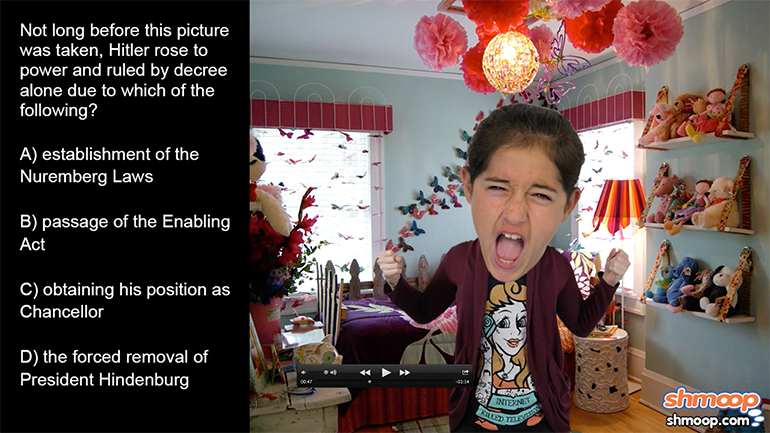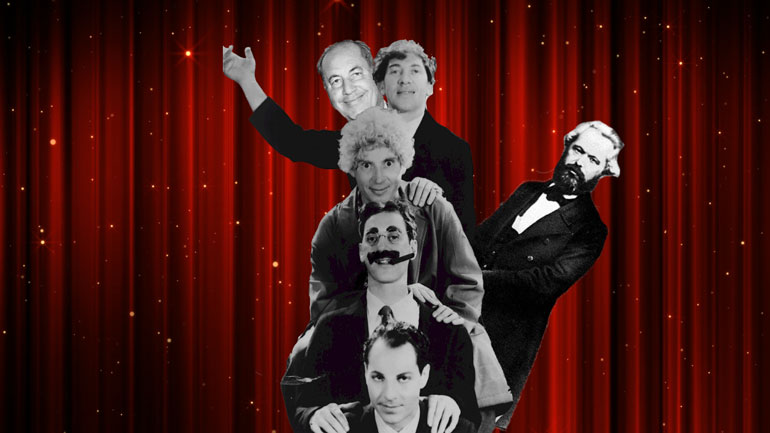ShmoopTube
Where Monty Python meets your 10th grade teacher.
Search Thousands of Shmoop Videos
AP European History 1.1 Period 3: 1815-1914 11 Views
Share It!
Description:
AP European History 1.1 Period 3: 1815-1914. Supporters of the passage would most likely agree with which of the following statements?
Transcript
- 00:04
And here's your shmoop du jour brought to you by Karl Marx, the Marx
- 00:07
brother who rejected the family business and business well in general sorry there [Karl Marx with his brothers]
- 00:13
comrade.. Take a look at the passage..[Quickly mumbles passage]
- 00:16
[mumbling]
- 00:19
[mumbling]
Full Transcript
- 00:23
communistic revolution proletarians have nothing to lose but their chains, they
- 00:28
have a world to win.. working men of the countries unite yeah thank you and
- 00:32
here's the question - Supporters of the passage would most likely agree with
- 00:36
which of the following statements and hear your potential answers....Oh Karl Marx if
- 00:43
only his favorite color was something other than red. The Chartreuse Scare of [The Chartreuse Scare]
- 00:48
the 1950s it would have been slightly more amusing anyway colors aside
- 00:52
supporters of this passage would most definitely be called Marx supporters [People wearing Karl Marx T-shirts]
- 00:55
would they agree with the statement that A; communism brought the bourgeoisie to
- 01:00
power well according to Marx the bourgeoisie was the social class that owned
- 01:03
the means of production perpetuated capitalism communism didn't bring them
- 01:08
to power it would actually weaken them communism is bourgeoisie kryptonite which
- 01:13
puts A out of the running. Would Marx agree with the idea that B - commercial
- 01:17
capitalism supported the proletariat well another quickie vocab lesson here
- 01:22
people the proletariat is the working class the proletariat are the ones the [Person making coffee]
- 01:27
bourgeoisie sticks into factories with no coffee machines or smoke breaks since
- 01:32
capitalism helps the bourgeoisie it hurts the proletariat, lots of kryptonite
- 01:36
here going around what about D? Did Marx believe that ownership of private [Marx stomping on a pile of cash]
- 01:41
property would always prevail well if you look very closely at the earlier
- 01:46
passage you might find a very subtle little hint indicating how Marx feels
- 01:50
about the ruling class of private property owners be right here when Marx
- 01:55
says let the ruling classes tremble at a communistic revolution he's implying [Sentence of passage highlighted]
- 02:00
that he and his communist buddies aren't totally in love with the ruling class [Marx with a communist]
- 02:03
yeah Karl Marx was a lot of things, economist, philosopher etc but he wasn't
- 02:08
king of subtlety that eliminates D.. meaning that Marx and his supporters
- 02:12
believed C - that socialism would eventually replace
- 02:16
capitalism. Marx felt that a natural tendency of capitalism was
- 02:19
self-destruction and that a working-class revolution would [People carrying socialism]
- 02:22
eventually bring its demise replacing it instead with socialism so C is the
- 02:26
correct answer for more thoughts on just how correct Marx was, well open a copy
- 02:31
of animal farm and don't forget an umbrella because, well you're in for some
- 02:34
serious George Orwell shade [Man reading and George Orwell appears]
Up Next
AP European History Period 1: 1450-1648 Drill 2, Problem 1. As a result of the meeting in the image, which of the following occurred?
Related Videos
AP European History Period 3: 1815-1914 Drill 2, Period 1, Les Demoiselles d'Avignon represented the beginning of which of the following art m...
AP European History Period 3: 1815-1914 Drill 2, Problem 4. Paintings like the one depicted above were a direct reflection of what?
AP European History 1.2 Period 4: 1914-Present Not long before this picture was taken, Hitler rose to power and ruled by decree alone due to which...
AP European History 1.4 Period 3: 1815-1914. As evidenced through the passage above, Karl Marx was a passionate leader and is considered the father...




